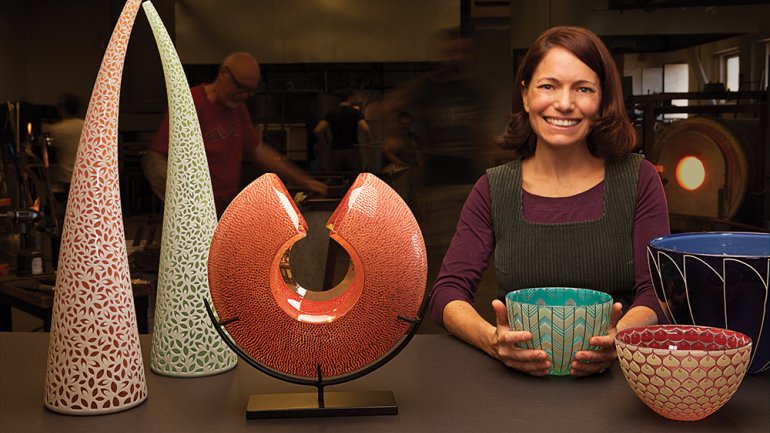Beautiful Impulse
Beautiful Impulse
Carrie Gustafson delights in creating objects that bring joy. At craft fairs, she loves seeing visitors’ faces light up when they catch sight of her booth, with its display of exquisitely patterned glass vessels and sculptures in a rainbow of brilliant colors.
“It sounds kind of hokey, but people are so happy looking at the work,” says the artist, 42, who is based in Cambridge, Massachusetts. That’s fine with her, since an edgy statement has never been her intent. “I just really want to make beautiful things.” Unapologetically gorgeous, Gustafson’s works radiate depth and movement. Each bowl, bottle, cylinder, and sculpture is a unique interplay of form, color, pattern, and texture, often inspired by some natural wonder she has seen: seashells, a tangle of grass, a crystal in the Harvard Museum of Natural History, a waterfall in India.
Their intricate, etched surface designs can be precise and orderly, like latticework or a honeycomb, or more randomly organic, suggesting a nest or a jagged horizon. All of them begin with color.
“Color is the basis for my storyboard,” Gustafson says of her design process. She starts by drawing a shape and selecting a combination of glass color bars – usually three – that will be heated, layered, and blown into a three-dimensional form. Her choices depend on the mood she’s trying to convey, and the possibilities are endless. The inner layers of a bowl might be “really killer brights, screaming yellows and oranges,” with a neutral color on the outside – maybe a muted celadon or transparent green – to quiet it down. Or she’ll top off icy blues with a final layer of clear glass, just to “gleam it up,” make it really shimmer. “The toning that you can get when you overlay color is subtle, but for me it’s the difference,” she says. Once she chooses her palette, it’s on to the hot shop, where the forms are handblown by glass artist Pablo Soto, her gaffer for the past five years.
Next comes the part that completes Gustafson’s signature look. With an X-Acto knife, she carves a pattern out of a piece of rubber resist, making hundreds or thousands of individual, often impossibly tiny cuts, intuiting the design as she goes along. (She keeps the scraps and will sometimes use them to make a reverse or free-form pattern for another piece). She then applies the finished stencil to the glass form, and sandblasts through the layers of color. The end result is a textured, optically complex etched surface that catches and reflects light in all kinds of wondrous ways.
What Gustafson does to magical effect is blend glassmaking with her original interest, graphic art. Growing up in Massachusetts, she had an artistic role model in her grandfather, Paul Gustavson (he spelled it with a “v”), an artist for Marvel and other publishers during the golden age of comic books; he was the creator of such superheroes as the Arrow, the Spider, and Fantom of the Fair. He also drew the iconic Sunbeam Bread girl, she says. “As a kid, I was constantly copying his cartoons,” she remembers.
At Rhode Island School of Design, she majored in print-making. Then an elective course in glassblowing changed her direction. “Glass really fed my imagination,” she says, “in a way that I wasn’t getting from paper.” Her passion solidified during her junior year abroad, when she worked for the Italian glass maestro Dino Rosin in Venice; later, she would hone her skills at Pilchuck Glass School, Penland School of Crafts, and the Corning Museum glass studio. Her first job after graduation was at the studio and gallery of glass artists Andrew Magdanz and Susan Shapiro on Martha’s Vineyard, where she sold her earliest pieces.
Magdanz and Shapiro also own Avon Place Glass, the facility in Cambridge where Gustafson has had her studio since 1997, sharing space with a or so dozen or so other artists. It’s a convenient 10-minute bike ride from the condo she shares with her husband, Joseph Santiago, a handyman and mechanic.
As her career has progressed, she has had work exhibited at Fuller Craft Museum and Bellevue Arts Museum, as well as at high-end retail venues such as the Smithsonian Craft Show. In 2011 she did a residency at the Museum of Glass in Tacoma and received a grant from the Massachusetts Cultural Council.
Lately she’s been branching out, creatively and professionally. She’s making more sculptural, open forms, inspired by African currency bracelets. And she’s launched a boutique line of smaller, affordable items available through her website; she enjoys the little morale boosts those sales bring: “As an artist, you need that.”
She’s eager to do more site-specific work, like the light fixture she made for a home featured on the PBS series This Old House. (Host Norm Abram visited her studio and interviewed her for the episode.)
She’s also excited about doing a large outdoor commission in the near future. That project is still in the planning stages, so Gustafson doesn’t know yet exactly what form it will take. We can be fairly sure of one thing: It will be beautiful.
Carrie Gustafson will exhibit at the Smithsonian Craft Show, April 10-13. Joyce Lovelace is American Craft’s contributing editor.

